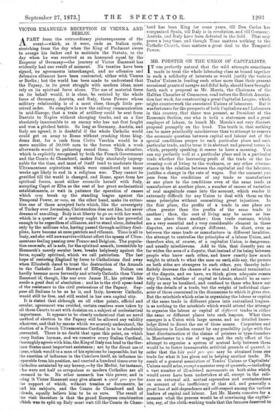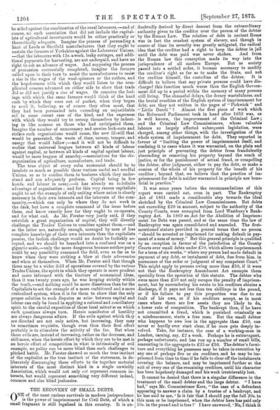MR. FORSTER ON THE UNION OF CAPITALISTS. I T was perfectly
natural that the wild attempts sometimes made to treat the whole labouring class as bound together in such a solidarity of interests as would justify the various Trades' Unions in lending each other more than their present occasional grants of meagre and fitful help, should have brought forth such a proposal as Mr. Morris, the Chairman of the Halifax Chamber of Commerce, read before the British Associa- tion last week, for constructing a great Capitalist League, which might counterwork the associated 'Unions of labourers. But it was fortunate for the prospects of both Capitalists and Labourers in this country, that there was present, as President of the Economic Section, one who is both a statesman and a great employer of labour, to knock Mr. Morris's not very discreet proposal promptly on the head. The truth is, that nothing can be more practically mischievous than to attempt to remove the economic question between capital and labour out of the special conditions proper to each particular place and each particular trade, and to treat it in abstract and general terms in which, properly speaking, it ceases to have a meaning. You can say perfectly well at a particular place and in a particular trade whether the increasing profit of the trade or the in- creasing cost of living to the workmen, or any other circum- stance in the relation between the capitalist and the labourer, justifies a change in the rate of wages. But the moment you pass from the conditions of any trade or manufacture at one place to the conditions even of the same trade or manufacture at another place, a number of causes of variation of real magnitude come into the account, which render it extremely difficult for any Union to deal with them on- the same principles without committing great injustices. In the first place, the profits of a trade in one place are often greater than the profits of the same trade in another ; then, the cost of living may be more or less in one place than another ; then trade customs, which are a very essential and a very considerable element in these disputes, are almost always different. In short, even as between the same trade or manufacture in different localities, the attempt to centralise the principles of a labour Union, and therefore also, of course, of a capitalist Union, is ,dangerousi and usually mischievous. Add to this, that directly you so far widen the area of a dispute,' that instead of its being between people who know each other, and know exactly how much weight to attach to what the men- on each side say, the powers on both sides are- strangers to' each other, you thereby inde- finitely decrease the chance-of a wise and rational termination of the dispute, and we have, we think, given adequate reason why Unions, whether of capital or labour, should be as care- f ally as may be localised, and- confined to those who know not only the details of a trade, but the weight of individual char- acter of those concerned in the discussions to which it gives rise. But the mischiefs which arise-in organising' the labour or capital of the same trade in different places into centralised leagues, is as nothing to the mischiefs which would attend the attempt to organise the labour or capital of diftrent trades in either the same or different places into such leagues. What then emerges is a Union with large means, and no detailed know- ledge fitted to direct the use of those means. Carpenters and bricklayers in London cannot by any possibility judge with the least discrimination of the claims of printers or type-founders in Manchester to a rise of wages, and the only effect of the attempt to organise a system of mutual help between them would be to foster innumerable artificial grounds of quarrel, in order that the fair quid pro quo may be obtained from one trade for what it has given out in helping another trade. No result of a general association of Trades' Unions or Capitalists'• Unions could arise, except a monster crop of quarrels,—including a vast number of ill-advised movements on both sides which would never have been undertaken at all, except in the reli- ance on external aid, mutual reproaches and recriminations on account of the inefficiency of that aid, and generally a great loss of self-dependence and self-respect among the various leaders of capital and labour. Let Mr. Morris conceive for a moment what the process would be of,convincing the capital- ists, say, of the cloth-working trade that the farmers deserved-to be aided against the combination of the rural labourers,—and of course, no such association that did not include the capital- ists of agricultural investments would be either practically or theoretically adequate. Imagine the process of persuading a knot of Leeds or Sheffield manufacturers that they ought to sustain the farmers of Yorkshire against the Labourers' Unions, —that the labourers with 12s. a week, leaky cottages, and addi- tional payments for harvesting, are not underpaid, and have no right to ask an advance of wages. And supposing the process of persuasion successfully completed, imagine the farmers called upon in their turn to assist the manufacturers to resist a rise in the wages of the wool-spinners or the cutlers, and the hopelessness with which they would listen to the com- plicated reasons advanced on either side to show that trade did or did not justify a rise of wages. Or conceive the feel- ings with which the same farmers would think of the hard cash by which they were out of pocket, when they began to need it, believing, as of course they often must, that they had been persuaded into extending an unjustifiable aid in some recent case of the kind, and the eagerness with which they would try to recoup themselves by indent- ing in like manner on those who had anticipated them. Imagine the number of unnecessary and unwise lock-outs and strikes such organisations would cause, the new that would be generated, the waste of .time, money, temper, and energy that would follow ;—and it will not be difficult to realise that universal leagues between all kinds of labour against capital, or between all kinds of capital against labour, would be mere leagues of anarchy,—associations for the dis- organisation of agriculture, manufacture, and trade. The true object of every calm economist should be to insulate as much as possible these various useful and needful Unions, so as to confine them to business which they under- stand and can adequately perform. Capital being in few hands, and labour in many,—it has already an indefinite advantage of organisation ; and for this very reason capitalists ought to set the example of only uniting where union is clearly necessary in their own interests and the interests of the com- munity,—which can only be where they do not work in the dark, but have a complete command of the issue before them, and know exactly how far they ought to co-operate, and for what end. As Mr. Forster very justly said, if they establish a great organisation, of capital, they will directly challenge the Trades' Unions to combine against them,—and as the latter are, naturally enough, managed by men of less complete knowledge of their own interests than the capitalists possess, the foolish challenge would no doubt be foolishly ac- cepted, and we should be launched into a confused war on a gigantic scale, only the more dangerous because neither party could by any possibility command the field, even so far as to know when they were striking a blow at their adversaries and when at themselves. When Mr. Forster said that though there may be a wider field of operations covered by the various Trades Unions, the spirit in which they operate is more prudent and more informed with the tincture of economical ideas, than it was twenty years ago, he was keeping strictly within the truth,—and nothing could be more disastrous than for the Capitalists to set the example of a more embittered and a more centralised system, when it is for them to show that the only proper solution to such disputes as arise between capital and labour can only be found in applying a rational and conciliatory spirit to the careful exposition of those local minutiae on which such questions always turn. Heroic manifestos of hostility are always dangerous affairs. If the evils against which thay are directed are not only active, but increasing, they may be sometimes requisite, though even then their first effect probably is to stimulate the activity of the foe. But when these evils are, instead of increasing, rather on the decrease, and still more, when the heroic effort by which they are to be met is an heroic effort of competition in what is intrinsically of evil example, no policy can be more blind than such challenges to pitched battle. Mr. Forster showed as much the true instinct of the capitalist as the true instinct of the statesman, in de- liberately discouraging these efforts to tie together material interests of the most distinct kind in a single unwieldy Association, which would not only not represent common in- terests, but would represent something very different indeed, common and also blind jealousies.



































 Previous page
Previous page